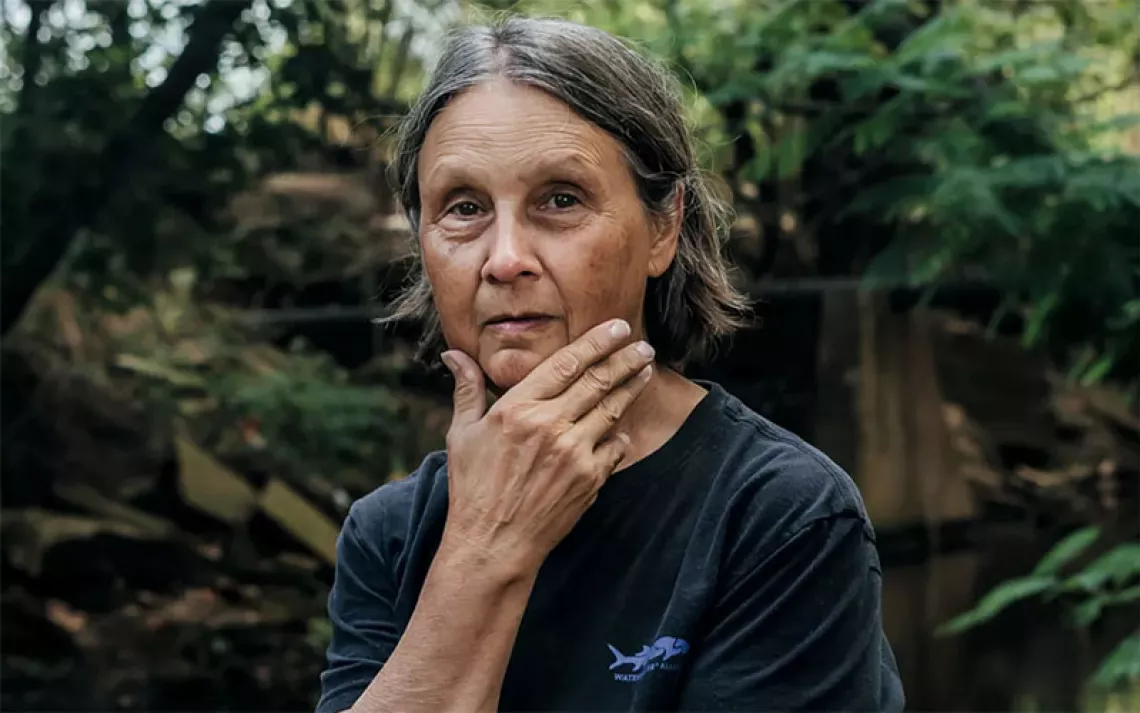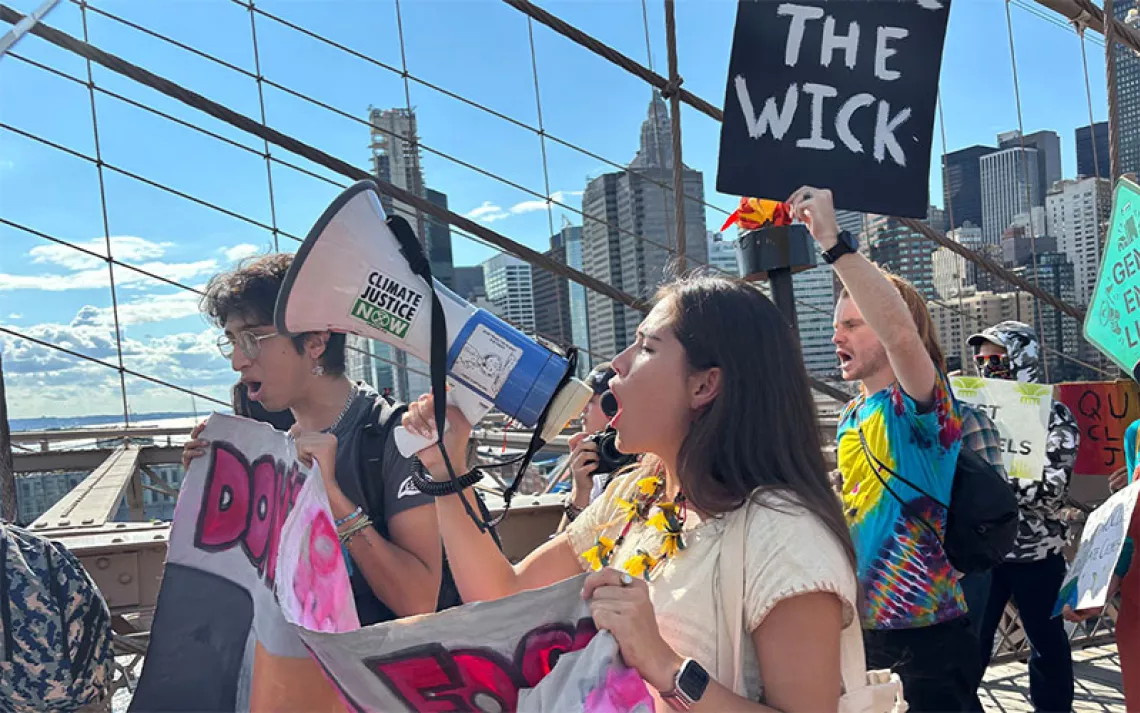Lights, Camera, Activism!
A sneak peek into this year’s best—and most inspiring—environmental films

Courtesy of photographer Darby Allison and the Wild & Scenic Film Festival
Movies make viewers yearn to become tornado-chasers, race-car drivers, heroic cops, and even ghost-busters. Sometimes, they also help turn cinephiles into environmentalists.
Such was the logic driving Nevada City, California’s South Yuba River Citizens League (SYRCL)—a group of volunteer activists working to protect and restore the Sierra Nevada’s dam-ridden Yuba watershed—when they launched the Wild & Scenic Film Festival in January 2003. The idea was to promote their message, fundraise for the cause, and explore a range of other local and global environmental issues via the exciting and communal medium that is the silver screen.
Wild & Scenic films explore matters of environmental justice. They educate about endangered species and empower viewers to vicariously experience harrowing feats via outdoor adventurers’ footage. Considering that the festival takes place within the historic theaters and miners’ foundries of Nevada City, a charmingly restored Gold Rush village nestled into the foothills of the Sierras, the title fits. The festival’s namesake in fact commemorates the 1999 designation of "Wild & Scenic" status for 39 miles of the South Yuba River, a landmark SYRCL achievement.
Environmental groups from across the country, recognizing the festival as a powerful tool to spark activism, were quick to request that SYRCL bring it to their communities, too. So, Wild & Scenic hit the road, broadcasting select films worldwide at nonprofits, museums, and nature centers, currently with 39,000 viewers annually—making it the environmental film festival with the world’s biggest reach. What’s more, it raised about $500,000 for a range of conservation causes in the past year.
Each January, Wild & Scenic kicks off over a long weekend in Nevada City. Last weekend’s 15th annual festival showcased 140 feature films, nature documentaries, adventure flicks, eco-centric shorts, and more—as well as post-screening live Q&As with several of the filmmakers. The four-day-long event—sponsored by national brands including Clif Bar, Patagonia, Sierra Nevada, Earthjustice, Orion magazine, Klean Kanteen, and Barefoot Wine—drew thousands to its venues, workshops, and events, which featured speeches from the likes of environmental poet Gary Snyder and activist/artist Tom Killion. Nearly every film was screened before a packed house; the festival culminated in a champagne-drenched awards ceremony, held in a stone-walled miners foundry that in 1879 became the first manufacturing site of the Pelton wheel. The winning films, vetted by a jury of esteemed conservationists, activists, and reviewers, make for worthy additions to any greenie’s “must watch” list for 2017.
However, the first-announced winner, in the category of Best Kids Film, was selected and presented by an alternate jury, fittingly comprised of local kids. After much debate, the festival’s youngest environmentalists selected The Gnomist—a magical 20-minute flick documenting the true and very mysterious appearance of fairy homes in a forest in suburban Kansas City. The regular jury went on to present its Student Filmmaker Award to Roshan Patel, an MFA candidate and the creator of Red Wolf Revival—a vivid short documenting a historic wild red wolf recovery effort in eastern North Carolina. The John de Graaf Environmental Filmmaking Award—bestowed in honor of the eponymous documentary filmmaker who produced more than a dozen prime-time national PBS specials—went to David Vassar, an Oscar-nominated and Emmy-winning writer and director, perhaps best known for his many cinematic contributions to national park visitor centers.
The jury awarded honorable mentions to three films: Douglas Tompkins: A Wild Legacy, a tribute to the renowned adventurer (and The North Face co-founder) who was tragically killed in a Patagonian kayaking accident in late 2015; The Good Mind, a stirring, hour-long documentary about the tireless environmental advocacy of New York State’s Onondaga Nation, an indigenous sovereign nation that has never accepted U.S. citizenship, and whose leaders shared prophesies about climate change while engaged in a landmark battle with the federal government over ancestral land (the Onondagas won, citing violation of a 1794 treaty with George Washington); and Pickle, a morbidly funny 15-minute ode to a late fish who never learned to swim and a celebration of humankind’s capacity to care for all the earth’s creatures.
Two beautiful films fetched Jurors’ Choice awards: Boone, a feature-length experimental documentary, told sans interviews but rather in “sensual homage” style, about young goat farmers who develop a deep relationship with their land; and In Pursuit of Silence, an artful and meditative exploration of our relationship with silence and sound and the impact of noise on our lives, which is set to hit U.S. theaters in 10 cities next month.
Best Short went to Pangolin, a 13-minute reveal of the journey and afterlife of one among the world’s most illegally trafficked mammals—since the moment it’s poached from the wild to when it’s smuggled to its final destination in China. The documentarians behind Elk River, about the migration of elk in Yellowstone, took home the Most Exciting Adventure Film award; Best in Theme, awarded according to this year’s festival theme—On the Edge—went to Fractured Land, which details the plight of Caleb Behn, a young First Nations lawyer in Canada tasked with reconciling his people’s need for jobs with what he sees as his sacred duty to defend their territory from some of the world’s largest fracking operations. For that film most embodying the Spirit of Activism, jurors selected Can You Dig This?, an energizing work about the unlikely urban gardening movement taking root in South L.A.
As for Best of Festival? The most prestigious Wild & Scenic award went to The Islands and the Whales, a feature-length investigation into the plight of Faroe Islanders—who have long harvested the sea for sustenance—as they come to grips with the fact that today’s polluted oceans contaminate and toxify their beloved whales.
Jonesing to see any of these winners? You may be in luck. Wild & Scenic films are already en route to Huntsville, Alabama, Berlin, and Pocatello, Idaho. Find the full touring schedule here. Interested in getting in on that special brand of movie magic that inspires environmental action? Here’s some more information on how to apply to host a leg of tour.
 The Magazine of The Sierra Club
The Magazine of The Sierra Club



